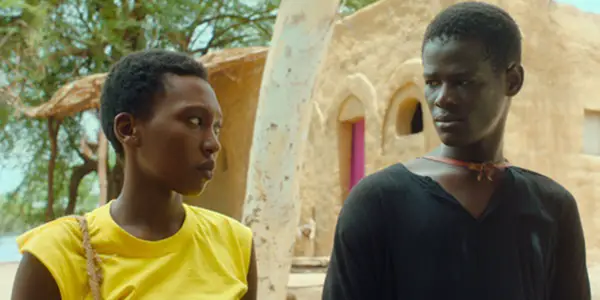BANEL & ADAMA: Duty And Desire

Lee Jutton has directed short films starring a killer toaster,…
What do you do when the love you need to survive appears to threaten the survival of everyone around you? Such is the spiritual question at the heart of Banel & Adama, the hauntingly beautiful directorial debut of French-Senegalese filmmaker Ramata-Toulaye Sy. Only the second film directed by a Black woman to compete for the Palme d’Or at the Cannes Film Festival—with Sy following in the footsteps of fellow French-Senegalese filmmaker Mati Diop and her equally stunning Atlantics—Banel & Adama is a feminist fable of feverish intensity, set in a remote village in northern Senegal where tradition and superstition still reign supreme. The film paints the star-crossed romance between the two title characters in vibrant colors shaded with magical realism, resulting in some of the most spellbinding cinematic images of this or any year.
The Thirst for More
Banel (Khady Mane) is a fiery, rebellious young woman who loves nothing in this world as much as her husband, Adama (Mamadou Diallo). While Banel was previously married to Adama’s older brother against her will, a tragic accident coupled with religious custom decreeing that the younger brother must marry the widow of the older ensured that these two young lovers have a second chance to be together—one that Banel is determined not to waste. She dreams of a life free from the restrictions imposed by village life that force her to spend her days doing chores with the other women instead of herding cattle with Adama. Whenever the couple has a spare moment, they head to the dunes on the outskirts of the village to dig two buried houses out of the sand that they hope to make their own someday.

However, Banel’s plans for the future are threatened by the village’s line of succession, which demands that Adama become the next chief—a responsibility he and Banel refuse to accept. In addition, to keep the male line unbroken, Banel is pressured to give birth to a son despite having no desire for children; Adama is all that she wants or needs to be happy. But when an almost apocalyptic drought strikes the village, Adama’s resistance to outside pressures begins to waver under the weight of worries that this catastrophic tragedy has been brought on by his reluctance to become chief. But whether it be a curse or climate change, the devastation of the drought is undeniable—and the effect it has on their relationship sends Banel spiraling into a fever dream of desperation, willing to do anything to keep Adama by her side.
Body and Soul
Throughout Banel & Adama, the film’s title begins to resemble a catechism, written by Banel over and over on paper and repeated over and over to herself so that she might draw strength from it to survive. A free spirit stuck in a strictly governed world, Banel is constantly fighting back against the restrictions of her environment, taking out her frustrations on small animals with a slingshot. Her passion for Adama verges on obsession, more and more so as the film progresses and Adama begins to drift further and further from the path they’ve cleared for their futures—something that is (painfully, perfectly) exemplified by his evolution from digging out their houses in the dunes to digging graves for those who have died during the drought.

At the heart of Banel & Adama is the clash between one’s desires and one’s duty to the community, and the struggle to maintain the former without neglecting the latter. Sy’s capable direction ensures that the non-professional actors who comprise the cast of the film all do an admirable job at bringing these characters and their specific world to life on screen, albeit none more so than Mane; stalking through the film with Banel’s rebellious nature writ across her face, she is a force of nature almost on par with the drought itself. But if Banel’s resolve is as sturdy and stubborn as a tree, Adama’s is more like a reed, subject to being bent and broken by the changing winds; while this stark difference between them had previously helped to cement their bond, it now threatens to destroy them.
Banel & Adama is exquisitely photographed, with a color palette rich with deep blues and bright oranges captured by cinematographer Amine Berrada. When the camera moves, slowly yet fluidly tracking in and around the characters, one feels as though one is pacing around a painting in a museum to appreciate it from every angle. It helps that both leads, in particular, have arrestingly beautiful faces seemingly meant to be photographed and projected on screens larger than life; just looking at them is almost enough to cast a spell on the viewer. Still, the Western African landscape surrounding them is nearly lovely enough to challenge them for star status, which is no small feat.
Conclusion
A powerful and poetic debut feature, Banel & Adama signifies Sy as an exciting young artist to watch in world cinema.
Banel & Adama opens at Film Forum in New York on June 7, 2024.
Does content like this matter to you?
Become a Member and support film journalism. Unlock access to all of Film Inquiry`s great articles. Join a community of like-minded readers who are passionate about cinema - get access to our private members Network, give back to independent filmmakers, and more.
Lee Jutton has directed short films starring a killer toaster, a killer Christmas tree, and a not-killer leopard. Her writing has appeared in publications such as Film School Rejects, Bitch: A Feminist Response to Pop Culture, Bitch Flicks, TV Fanatic, and Just Press Play. When not watching, making, or writing about films, she can usually be found on Twitter obsessing over soccer, BTS, and her cat.













